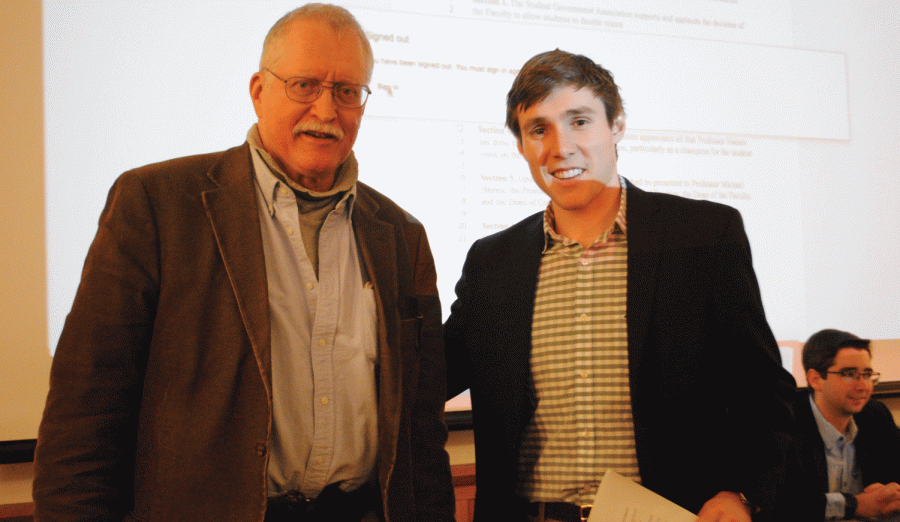SGA Passes Resolution for Double Minor
Professor Michael Haines and President of the SGA, senior Matthew Swain, bring good news about their successfully-passed resolution to the Senate.
This past Monday, February 27, Colgate’s faculty passed the Student Government Association’s (SGA) resolution on changing the academic policy to include an option for students to double minor. Before the passing of this resolution, students were able to double major or have a major and a minor, but the possibility of double minoring with a single major was not an option. This resolution was a way to change the academic policy to include double minoring with a single major.
Interim Dean of the Faculty and Provost Constance Harsh, who holds the responsibility of proposing academic policy changes to the faculty, was in attendance at the vote on the resolution. As the Dean of Faculty and Provost, she leads the Academic Affairs Board (AAB), which is made up of a coalition of faculty, students and administrators. According to the Colgate website, the AAB works on projects that “include long-range academic planning.” As a result, this resolution fell under the responsibilities of the AAB.
“The committee worked carefully over the course of several months this year to discuss the possibility of adding the option for students [to] declar[e] a major and two minors. We looked at our peer schools and found that about half of them already offer this possibility. The Registrar helped us imagine what a student’s program might look like under the new policy. Student representatives provided information from SGA discussion and from a survey that they conducted,” Harsh said. “Everyone on the committee engaged in a careful consideration of the pros and cons before we put forward a proposal. This was a good example of Colgate’s shared governance system operating effectively.”
According to Banfi Vintners Professor of Economics Michael Haines, there were approximately 100 faculty members in attendance at the meeting to discuss the resolution. Haines is an elected faculty member of the AAB, and he volunteered to present the resolution at an earlier faculty discussion and at the vote on Monday. He said that there was some debate on the topic at a previous faculty discussion, but that support during Monday’s vote was overwhelming. Haines also indicated that several faculty members, including Associate Dean of the Faculty for International Initiatives and Professor of Economics Nicole Simpson and Tori Carhart from the Registrar, were integral in this process.
Senior Matthew Swain, SGA President, discussed how important the passing of this resolution is, not only to the SGA but to the Colgate student body in general. Swain says that this addition to the academic policy has continuously been proposed for ten years by the SGA, and that one of the main goals of his campaign was to ensure that this resolution get passed.
“The Swain-Kang administration has been working on this ever since we got elected. It was a focal point on our platform. We were continually told it could not be done so I got an early start forming arguments for why students should be able to double minor. I came into AAB in the fall knowing that this was one of the top points on my agenda. The AAB has talked close to every meeting about the double minor since Fall of 16’ (when I entered),” Swain said.
Sophomore and Speaker of the Senate Jennifer Lundt worked with Swain and Vice President of the SGA senior Iris Kang, as well as other members of the SGA, on the resolution. Lundt noted the apprehension that members of the SGA felt in pushing for this resolution, especially since those who had tried to get this resolution passed in the past had not succeeded. Lundt expressed her excitement that the SGA decided to continue to push for this academic policy change and that the resolution had been passed as a result.
“In my eyes, this is a tremendous accomplishment for students. Students are going to have [the ability] to explore three different things now and be able to market themselves professionally as having proficient knowledge in three different fields,” Lundt said. “I also know several instances among my senior friends where they have taken enough classes to get the double minor but the school wouldn’t allow them. Now students who work especially hard can be rewarded for all of that.”
Swain similarly indicated the importance of allowing students to expand their academic interests and to be able to show their diverse knowledge.
“The passing of this resolution is going to allow students to be a part of more intellectual communities on campus. It will also recognize the achievement of taking the classes necessary for a second minor. Currently there are students who have graduated that could have been recognized for a second minor, but were not [allowed to] because of wording in the handbook,” Swain said. “This resolution overturns that. My hope is also that the resolution will inspire students to take more classes outside of their comfort zone and explore different intellectual communities on this campus and maybe even take on a fifth class.”
Lundt pointed out how this was an example of the administration listening to the desires of students, and she was pleased with this. From the administrative side, Harsh also considered this to be a positive achievement.
“I think that giving students the opportunity to become official members of another intellectual community will be powerful,” Harsh said. “And it may encourage students to think about their course of study in more meaningfully articulated ways. Colgate students have many interests and commitments, and this will give them a vehicle for [signaling] more of them.”







